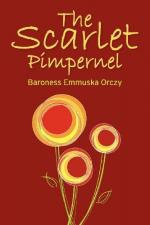Some half dozen men stalked into the little room. Men? They looked like ravenous beasts, and were unspeakably dirty, wore soiled tricolour scarves above their tattered breeches in token of their official status. Two of them fell on the remnants of the meagre supper and devoured everything that remained on the table—bread, cheese, a piece of home-made sausage. The others ransacked the two attic-rooms which had been home for Esther and Lucienne: the little living-room under the sloping roof, with the small hearth on which very scanty meals were wont to be cooked, and the bare, narrow room beyond, with the iron bedstead, and the palliasse on the floor for Lucienne.
The men poked about everywhere, struck great, spiked sticks through the poor bits of bedding, and ripped up the palliasse. They tore open the drawers of the rickety chest and of the broken-down wardrobe, and did not spare the unfortunate young girl a single humiliation or a single indignity.
Kennard, burning with wrath, tried to protest.
“Hold that cub!” commanded the leader of the party, almost as soon as the young Englishman’s hot, indignant words had resounded above the din of overturned furniture. “And if he opens his mouth again throw him into the street!” And Kennard, terrified lest he should be parted from Esther, thought it wiser to hold his peace.
They looked at one another, like two young trapped beasts—not despairing, but trying to infuse courage one into the other by a look of confidence and of love. Esther, in fact, kept her eyes fixed on her good-looking English lover, firmly keeping down the shudder of loathing which went right through her when she saw those awful men coming nigh her. There was one especially whom she abominated worse than the others, a bandy-legged ruffian, who regarded her with a leer that caused her an almost physical nausea. He did not take part in the perquisition, but sat down in the centre of the room and sprawled over the table with the air of one who was in authority. The others addressed him as “citizen Merri,” and alternately ridiculed and deferred to him. And there was another, equally hateful, a horrible, cadaverous creature, with huge bare feet thrust into sabots, and lank hair, thick with grime. He did most of the talking, even though his loquacity occasionally broke down in a racking cough, which literally seemed to tear at his chest, and left him panting, hoarse, and with beads of moisture upon his low, pallid forehead.
Of course, the men found nothing that could even remotely be termed compromising. Esther had been very prudent in deference to Kennard’s advice; she also had very few possessions. Nevertheless, when the wretches had turned every article of furniture inside out, one of them asked curtly:
“What do we do next, citizen Merri?”
“Do?” broke in the cadaverous creature, even before Merri had time to reply. “Do? Why, take the wench to—to—”




